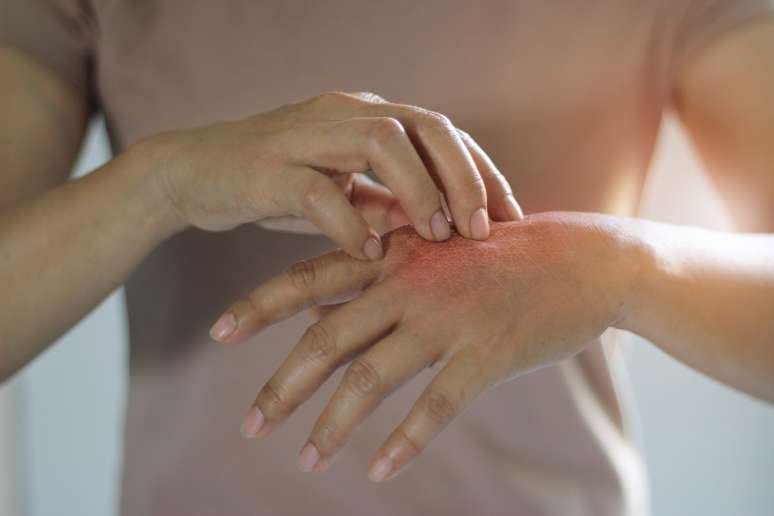Is your skin itching or red due to something? Find out how to avoid triggers
html[data-range=”xlarge”] figure image img.img-093adfd6691059e6dca52092e484aadfbc5n7xhf { width: 774px; height: 516px; }HTML[data-range=”large”] figure image img.img-093adfd6691059e6dca52092e484aadfbc5n7xhf { width: 548px; height: 365px; }HTML[data-range=”small”] figure image img.img-093adfd6691059e6dca52092e484aadfbc5n7xhf, html[data-range=”medium”] figure image img.img-093adfd6691059e6dca52092e484aadfbc5n7xhf { width: 564px; height: 376px; }HTML[data-range=”small”] .article__image-embed, html[data-range=”medium”] .article__image-embed {width: 564px; margin: 0 automatic 30px; }
Only those who have it know what it’s like: sensitive skin reacts to the most diverse triggers, such as intense cold, sudden changes in the weather or contact with certain chemicals. As a result, symptoms such as itching, swelling, redness and burning occur.
In some cases, sensitive skin goes hand in hand with diseases such as contact dermatitis, atopic dermatitis (with the presence of bumps or sores) or even rosacea (characterized by reddish spots). This is why it is always a good idea to consult a dermatologist to receive more adequate indications. In any case, below we have collected some useful tips to avoid inconveniences:
1-Look at the labels
Look for the words “skin-friendly” or “for sensitive skin” on labels. And check the ingredients if you already know any ingredients that might irritate your skin. As a general rule, the fewer ingredients, the better.
2-Take short showers
The water slowly strips the skin of its natural oils. This makes it more likely to become dry, tight, or cracked. Take short showers with hot or cold water, rather than long, hot ones.
3-Do some tests
If you’re still trying to determine your skin type, it’s a good idea to test out any new products before heading straight to the checkout. Choose a small part of your skin and apply a little. If there is a reaction within 72 hours, you will know it is not for you.
4-Hydrate yourself
Dry skin causes irritation and this can cause or worsen conditions such as eczema. The best way to prevent your skin from drying out is to apply creams immediately after a shower, while it is still damp. Use a thick but gentle moisturizer to keep your skin supple. And don’t forget to choose products specific to your skin type.
5-Be careful of nickel
It is one of the most common triggers for those with sensitive skin. This metal is present in everyday objects, from jewelery to clothespins and glasses. Take note of anything with metal that comes into contact with your skin. Swap the nickel stuff for hypoallergenic accessories when you can.
Watch:
- Atopic dermatitis: discover the main symptoms and treatments
- Myth or truth? The dermatologist reveals 20 questions about the skin
6-Eliminate fragrances
Many beauty products promise sweet scents as a selling point. But perfume is a complement that your sensitive skin doesn’t need and often can’t handle. The same applies to products with alcohol, soap or dye.
7-Choose the fabric well
Wool and other rough fabrics can make your skin itchy, even if your skin isn’t sensitive. Wool can even cause an allergic reaction. Lanolin is a natural wax contained in lanolin, and some clothing contains it. Opt for softer fabrics like cotton and silk.
8-Stop smoking
Yes, it’s bad for your overall health. But did you know that smoking can increase sensitive skin reactions, especially if you have psoriasis? It can also make it difficult to heal skin problems when they occur.
9-Avoid exfoliation
Leave aside articles that promise peeling (with chemicals) or abrasion (physical exfoliation). Dermatologists say that if you have sensitive skin, you don’t need to exfoliate to clean it. This could make your symptoms worse. Always look for products suited to your skin type.
Sources: WebMD / SBD (Brazilian Society of Dermatology)
Source: Terra
Ben Stock is a lifestyle journalist and author at Gossipify. He writes about topics such as health, wellness, travel, food and home decor. He provides practical advice and inspiration to improve well-being, keeps readers up to date with latest lifestyle news and trends, known for his engaging writing style, in-depth analysis and unique perspectives.









